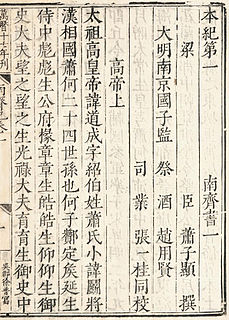
The Northern and Southern dynasties was a period in the history of China that lasted from 386 to 589, following the tumultuous era of the Sixteen Kingdoms and the Wu Hu states. It is sometimes considered as the latter part of a longer period known as the Six Dynasties. Though an age of civil war and political chaos, it was also a time of flourishing arts and culture, advancement in technology, and the spread of Mahayana Buddhism and Daoism. The period saw large-scale migration of Han Chinese to the lands south of the Yangtze. The period came to an end with the unification of all of China proper by Emperor Wen of the Sui Dynasty.

The Southern Qi (479-502) was the second of the Southern dynasties in China, followed by the Liang Dynasty. During its 23-year history, the dynasty was largely filled with instability, as after the death of the capable Emperor Gao and Emperor Wu, Emperor Wu's grandson Xiao Zhaoye was assassinated by Emperor Wu's intelligent but cruel and suspicious cousin Xiao Luan, who took over as Emperor Ming, and proceeded to carry out massive executions of Emperor Gao's and Emperor Wu's sons and grandsons, as well as officials whom he suspected of plotting against him. The arbitrariness of these executions was exacerbated after Emperor Ming was succeeded by his son Xiao Baojuan, whose actions drew multiple rebellions, the last of which, by the general Xiao Yan led to Southern Qi's fall and succession by Xiao Yan's Liang Dynasty.

The Liang dynasty (502–557), also known as the Southern Liang dynasty (南梁), was the third of the Southern Dynasties during China's Southern and Northern Dynasties period. It was located in East China and South China, and replaced by the Chen dynasty in 557. The small rump state Western Liang (555–587), located in Central China, continued until its annexation in 587.

The University of Science and Technology of China (USTC) is a national research university in Hefei, Anhui, China, under the direct leadership of the Chinese Academy of Sciences (CAS). It is a member of the C9 League, China's equivalent of the Ivy League. It is also a Chinese Ministry of Education Class A Double First Class University. Founded in Beijing by the CAS in September 1958, it was moved to Hefei in the beginning of 1970 during the Cultural Revolution.

Zhuge Liang's Northern Expeditions were a series of five military campaigns launched by the state of Shu Han against the rival state of Cao Wei from 228 to 234 during the Three Kingdoms period in China. All five expeditions were led by Zhuge Liang, the Imperial Chancellor and regent of Shu. Although they proved unsuccessful and ended up as a stalemate, the expeditions have become some of the best known conflicts of the Three Kingdoms period and one of the few battles during it where each side fought against each other with hundreds of thousands of troops, as opposed to other battles where one side had a huge numerical advantage.

Xiao is a Chinese surname. In the Wade-Giles system of romanization, it is rendered as Hsiao. It may also be romanized as Siauw, Sjauw, Siaw, Siew, Siow, Seow, Siu or Sui, as well as Shaw in less common situations, inspired by the transliteration of the surname of notable figures such as Irish playwright George Bernard Shaw and English actor Robert Shaw.

The Book of Qi or Book of Southern Qi is a history of the Chinese dynasty Southern Qi covering the period from 479 to 502, and is one of the Twenty-Four Histories of Chinese history. It was written by Xiao Zixian during the succeeding Liang Dynasty, and is unique in that Xiao Zixian was the only author of any of the Twenty-Four Histories to be a direct descendant of the founder of the dynasty being written about.
Liu Qi was an official who lived during the late Eastern Han dynasty of China. He was the elder son of Liu Biao, the Governor of Jing Province. He provided reinforcements and refuge for Liu Bei when the latter was fleeing from Cao Cao's forces after the Battle of Changban, and assisted Liu Bei and Zhou Yu in the following Battle of Red Cliffs.
Xiao Baoyin (蕭寶寅) (487–530), courtesy name Zhiliang (智亮), was an imperial prince of the Chinese dynasty Southern Qi. In 502, as Southern Qi was on the edge of being taken over by the general Xiao Yan, who was preparing by killing the imperial princes, Xiao Baoyin fled to rival Northern Wei and became an official and general in the Northern Wei government. In 527, as Northern Wei was embroiled in agrarian rebellions, Xiao Baoyin rebelled and tried to reestablish Southern Qi, but was soon defeated and forced to flee to a rebel leader, Moqi Chounu (万俟醜奴), and he served under Moqi until both were captured in 530 by the paramount general Erzhu Rong's nephew Erzhu Tianguang. He was forced to commit suicide.
Xiao Yuanming (蕭淵明), courtesy name Jingtong (靖通), often known by his pre-ascension title of Marquess of Zhenyang (貞陽侯), at times known by his post-removal title Duke of Jian'an (建安公), honored Emperor Min (閔皇帝) by Xiao Zhuang, was briefly an emperor of the Chinese Liang Dynasty. He was the nephew of the founding emperor Emperor Wu. In 555, with Liang in disarray after Western Wei had captured and killed Emperor Yuan, Northern Qi, which had held Xiao Yuanming as an honored captive since 547, forced the general Wang Sengbian to accept Xiao Yuanming as emperor. Soon, however, Wang's subordinate Chen Baxian killed Wang and removed Xiao Yuanming from the throne, replacing him with Emperor Yuan's son Xiao Fangzhi. Xiao Yuanming died the following year.
Emperor Jing of Liang, personal name Xiao Fangzhi (蕭方智), courtesy name Huixiang (慧相), nickname Fazhen (法真), was an emperor of the Chinese Liang Dynasty. As the only surviving son of Emperor Yuan, he was declared emperor by the general Chen Baxian in 555, but in 557 Chen forced him to yield the throne and established Chen Dynasty. In 558, Chen had him killed.

Shoucheng Zhang was a Chinese-American physicist who was the JG Jackson and CJ Wood professor of physics at Stanford University. He was a condensed matter theorist known for his work on topological insulators, the quantum Hall effect, the quantum spin Hall effect, spintronics, and high-temperature superconductivity. According to the National Academy of Science:
He discovered a new state of matter called topological insulator in which electrons can conduct along the edge without dissipation, enabling a new generation of electronic devices with much lower power consumption. For this ground breaking work he received numerous international awards, including the Buckley Prize, the Dirac Medal and Prize, the Europhysics Prize, the Physics Frontiers Prize and the Benjamin Franklin Medal.
The Breakthrough Prize in Fundamental Physics is awarded by the Fundamental Physics Prize Foundation, a not-for-profit organization dedicated to awarding physicists involved in fundamental research. The foundation was founded in July 2012 by Russian physicist and internet entrepreneur Yuri Milner.

The Battle of Mount Qi was a military conflict which took place around Mount Qi between the states of Cao Wei and Shu Han in 231 during the Three Kingdoms period of China. It was also the most vigorous of the five Shu invasions of Wei, resulting in thousands of deaths on both sides. Although Zhuge Liang was able to make significant achievement in the beginning of the battle, the battle finally concluded with a strategic Wei victory due to the insufficient food supply for the Shu Han army. The insufficient food supply was caused by heavy rain and mistakes made by Li Yan. The Shu regent, Zhuge Liang, spent three years recuperating before launching another invasion on Wei in 234.
Qi Jinli is a Chinese politician who spent most of his career in Henan province. As of December 2014 he was under investigation by the Communist Party's anti-corruption agency. Previously he served as the Communist Party Secretary of Kaifeng, Deputy Communist Party Secretary and Vice-Mayor of Luohe, and Deputy Communist Party Secretary of Zhengzhou.

Dear Mom is a 2014 Taiwanese television series produced by Sanlih E-Television. Starring Ling Hung, Joanne Tseng, Albee Huang, Beatrice Fang, Shiou Chieh Kai, Melvin Sia, Duncan Chow and Jack Lee as the main cast. The Chinese title literally translates to "My Four Precious Daughters", which is in reference to the four main female characters of the drama. Filming began on December 1, 2014 and will be filmed as the drama aired. First original broadcast began December 16, 2014 on SETTV channel airing weekly from Monday till Friday at 8:00-9:00 pm.
Xue Qikun is a physicist of Tsinghua University, Beijing. He has done much work in Condensed Matter Physics, especially on superconductors and topological insulators. In 2013, Xue was the first to achieve the quantum anomalous Hall effect (QAHE), an unusual orderly motion of electrons in a conductor, in his laboratory at Tsinghua University. Xue is a member of the Chinese Academy of Sciences, vice president for research of Tsinghua University, and director of State Key Lab of Quantum Physics. In 2016 he was one of the first recipients of the new Chinese Future Science Award for experimental discovery of high-temperature superconductivity at material interfaces and the QAHE. This award has been described as "China's Nobel Prize".
Wang Yifang is a Chinese elementary particle and accelerator physicist. He is director of the Institute of High Energy Physics (IHEP) of the Chinese Academy of Sciences in Beijing and known for contributions to neutrino physics, in particular his leading role at Daya Bay Reactor Neutrino Experiment to determine the last unknown neutrino mixing angle θ 13.

Ancestral Temple is a 2009 Chinese historical drama directed by Yan Jian Gang and stars Ruby Lin, Wang Yu, Zhao Hong Fei, and Pan Hong. The series is aired in China on Fujian TV Station on October 6, 2009 and running for 43 episodes.












